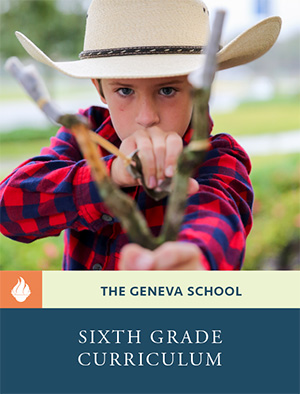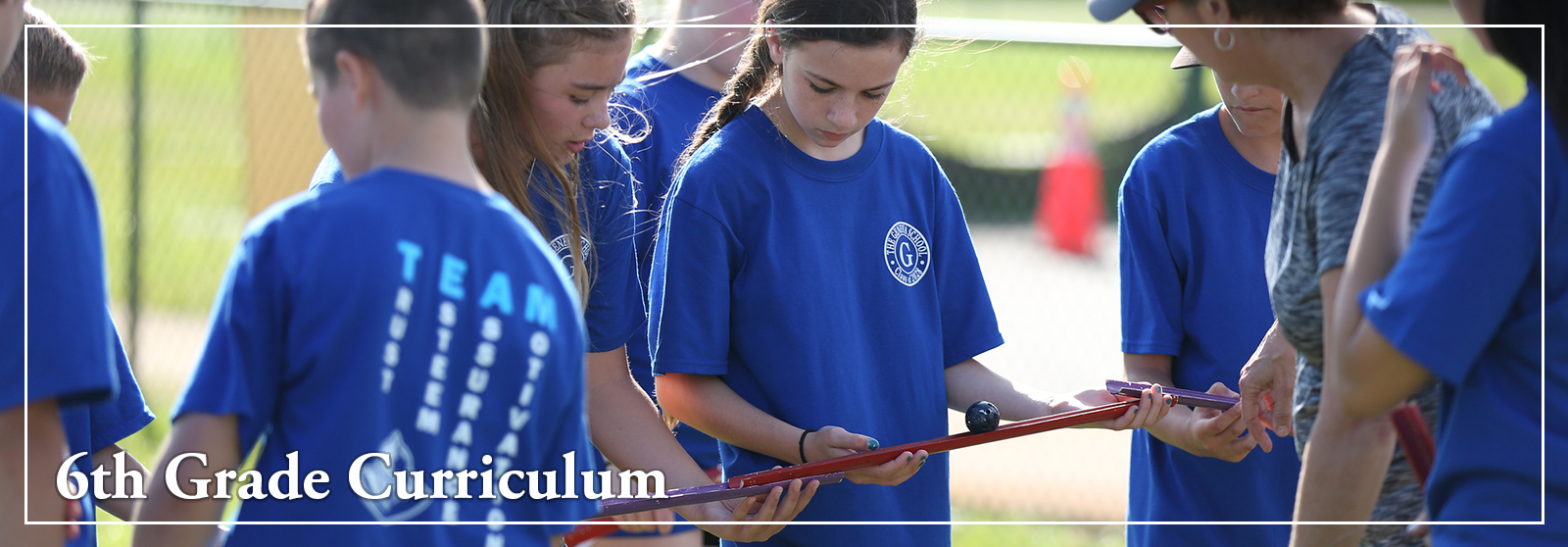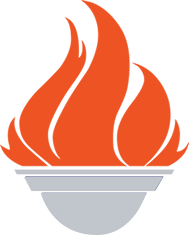6th Grade Curriculum

Wonder, inquisitiveness, and charity are a few words that capture the sixth grade experience. During this year—the culmination of the grammar school experience—the students build on their knowledge and prepare for their years in the dialectic and rhetoric school. The love of story is developed through literature, history, and Bible class time. In literature, students read coming-of-age stories and learn how the protagonists overcome their challenges. In history, they study the modern era and make connections with current events. In Bible, students continue to develop a love of God’s word as they study Acts and the Pauline epistles. The students practice important study and organization skills that empower independence and promote confidence by transitioning to full-size lockers and tables such as the ones dialectic and rhetoric students use as well as learning from all of the sixth grade teachers. The pinnacle of the student experience is a five-day trip to Williamsburg, Virginia, and Washington, DC. Teachers strive to foster a loving, charitable community so that students can love beauty, think deeply, and pursue Christ’s calling.
History
(1820–Present Day)
Sixth grade history begins in 1820 and ends with present-day American events. America is a country formed with the vision of manifest destiny—moving across the continent and expanding its influence into the wider world. So, as the nation emerges, sixth grade students study critical events that shift the course of US history. They confront complex issues that continue to influence the world we live in today. Beginning with the antebellum period, they trace the story of America through the Civil War, two world wars, and the Cold War. Along the way, students encounter influential Americans like Andrew Jackson, Frederick Douglass, Abraham Lincoln, FDR, and Martin Luther King Jr. Students begin to connect the history they have learned to current news stories, allowing them to meaningfully join an ongoing conversation.
Language Arts
Literature
To create excitement and to nurture a love of learning through books, teachers and students dive into books such as Across Five Aprils, The Hobbit, The Giver, Where the Red Fern Grows, and The Hiding Place. The main method students utilize to assimilate the text that they read is the classical practice of oral narration. Students also transfer their oral narrations to written narrations on a regular basis. This practice is foundational in strengthening the students’ abilities in reading comprehension, writing, and rhetoric. Teachers delight in building wonder and enlarging the moral imaginations of their students through expressive reading and engaging questions. Students also participate in literature circles, which involves completing reading assignments at home and coming together at school to discuss their reading passage with their classmates. The books chosen for literature circles follow the same themes as the books in literature class of adventure, discovery, and developing character as the protagonist journeys through the book. Students read A Land Remembered, The Princess and the Goblin, My Side of the Mountain, and The Magician’s Nephew. Through their experiences with their literature circles, students develop their independent reading, group discussion, and descriptive writing skills.
Composition
George Orwell states, “If people cannot write well, they cannot think well, and if they cannot think well, others will do the thinking for them.” Geneva aims to teach students the art of putting virtuous thoughts into words—true, beautiful, and persuasive words.
Sixth grade composition instruction is theme based, following the structure set forth by the Institute for Excellence in Writing. Over the course of the year, students’ writing increases in complexity as they compose in a variety of formats on such topics as the invention of the telegraph, Winston Churchill, and Sherlock Holmes.
Library Science
In sixth grade, students review book genres by discussing the hallmarks and value of each genre, and they are also given reading recommendations for each genre. They are encouraged to use the library computer catalog to find books and to send book recommendations to their classmates. Students also use the library to find resources for their various classroom research projects.
Mathematics
The aim of the think!Mathematics program is for students to engage with real-world problems and use conceptual understanding to solve, discuss, and explore the nature of mathematics. More than simply using discrete algorithms, mastering calculations, or applying formulas, students explore the reasoning behind their calculations and why mathematics works. Students build on their understanding from prior grades to develop and deepen their grasp of concepts such as ratios, integers, expressions, rational numbers, and geometry. Students are encouraged to use a variety of methods and tools to explain how they understand a problem. Moreover, students learn perseverance and collaboration as they learn to work with partners. By the end of the year, students have solidified and expanded their basic math grammar skills, explored beginning ideas of algebra, and learned to appreciate the order and beauty in God’s world.
Bible
Seeking to communicate the centrality of God’s word in a Christian’s life, teachers use Paul’s journeys and letters to create the backbone of biblical studies in sixth grade. The Acts of the Apostles and the Epistles provide a wealth of teaching on God’s faithfulness, loving-kindness, and hope for all believers. Sixth grade is a year of deepening the students’ knowledge of God’s character and how he would have us live. Amidst a year of students’ developmental and social shifts, the teachers seek to guide them through instruction, modeling, and teachable moments. The overarching desire is that students learn who God is and how to love others well in a fallen world.
Science
Using scale-model representations, where the Sun becomes a bowling ball and Earth is a peppercorn, sixth grade science students take a half-mile solar system walk that gives them an impression of the size of our amazing solar system. This is how students begin their study of space and the history of space exploration. These sixth grade students meet the characters involved in the space program and hear the stories surrounding the astounding accomplishment of the US challenge of sending men to the moon. When they view the History Channel video “Failure Is Not an Option,” they understand that hundreds of people on the ground at mission control led to the success of each moon mission. The unit on space culminates with a field trip to the Kennedy Space Center where students see the components of the US Apollo moon missions. When they see the amazing Saturn V rocket, they have already seen its components in their classroom Saturn V model. In this way, the students’ classroom learning experiences make their field trip more meaningful. For these students, examining these stories is tantamount to seeing “science in action.” With the goal of inspiring students to love learning about creation, they also explore other topics such as the earth’s structure, its magnetosphere, and plate tectonics. They dissect the earth’s crust by inspecting rocks and minerals, culminating in a geology dig where students sort rocks and minerals by type. All of creation, as it is uncovered by their studies, inspires admiration for our great God!
Foreign Language
In the sixth grade, students complete their introduction to Latin by learning different verb tenses and new forms of both verbs and nouns. After memorizing the imperfect and the future perfect tenses, students are introduced to the most frequent (and complicated) type of noun: third declension nouns. Students also continue building up a base of key vocabulary words, and they put their grammar knowledge into practice by translating sentences and short stories. Using flash cards and chants, students gain a confident grasp of the language through practice and repetition. Finally, students learn the Vulgate versions of some of their Bible memory passages to experience the historical nature of the Christian faith through their language studies.
Music
In every lower school grade at The Geneva School, music study and performance are vital to developing an aesthetically rich liberal arts education. Sixth grade marks the completion of a student’s grammar school music study at Geneva, and they develop a deep understanding and appreciation for the role music has played in our school, history, and the Bible.
Sixth grade students transition from unison soprano recorder instruction into ensemble arrangements, continuing to learn how to play with good breath support, technique, and developing tone. Students are introduced to the music of the Civil War and American West, engaging in activities to create, sing, and play recorders, and unpitched percussion. Students use their developing music theory skills to play and notate musical patterns consisting of sixteenth, eighth, quarter, half, and whole notes, along with quarter, half, and whole rests. They continue to review the notes on the treble staff, learn how to interpret a musical score, sing in parts, and read/play more complex meters and rhythms. These techniques are fostered in their yearlong study through their music workbook, Master Theory Book 1.
The sixth grade study of American pioneers, the impact of American wars and battles, and the Civil Rights Movement creates a unique opportunity to study patriotic songs, cultural folk tunes, twentieth-century composers, and the birth of American jazz. They also have the opportunity to further explore song form through the study of the blues.
Performances include Lessons and Carols, the spring concert, and their closing ceremony.
Art
In the sixth grade, students sculpt, draw, paint, and print, integrating their grammar studies in line, shape, form, volume, proportion, and color, with the goal of helping them to develop their own emerging sense of style and taste preference in the visual arts. Part of this process includes transitioning into understanding how and why a piece is executed and created. One way the students learn the variety of elements and principles of design is to imitate the well-known artists of the nineteenth and twentieth centuries. With deeper understanding of color theory and elements and principles of art, students are given more time on each project allowing for a focus on details and observation. Each project is thoughtfully designed to coordinate with the units of study. For example, students sculpt dwarf portraits during their literary studies of The Hobbit, learn about two-point perspective while studying the architecture of Washington, DC, and create landscape paintings inspired by the Hudson River School to coincide with the sixth grade history lesson of the Erie Canal.
Drama
The drama program not only seeks to enrich the students’ learning through experiencing history and literature but also seeks to build character through the rehearsal and production process. Students take on responsibilities appropriate to their developmental level and are encouraged to problem-solve and work together as a group to tell their story.
The sixth grade students perform The Hobbit, an adaptation of J. R. R. Tolkien’s classic epic fantasy. In this abbreviated version, students explore themes of friendship and bravery and the dangerous pitfalls of the love of money. Many spiritual truths are drawn out of this story as students find the heart and humanity in characters that may not even be human. This colorful adventure provides a broad range of acting opportunities with a motley of strong, eccentric roles. Scenes laced with comedy and action are balanced with honest, dramatic moments. Students also take on the responsibility of helping with several scene changes with large set pieces in order to bring this enchanting and moving tale to life.
Physical Education
The Geneva School is committed to providing a physical education curriculum that allows frequent and diverse opportunities to engage in physical activities that support a sound mind and healthy body. In sixth grade, students continue to learn about the importance of glorifying God through developing and maintaining a healthy lifestyle with one’s personal choices. Through exposure to a wide variety of activities, students gain the necessary knowledge to understand and make this part of their daily practice. Students learn the dynamic connections between the health- and skill-related fitness components. Sixth graders continue team sports education by learning rules, more complex techniques, and offensive and defensive strategies. Students explore in greater depth the key components of good teamwork and its direct correlation to good character and moral behavior as demonstrated by Jesus and outlined in the Scriptures. Cooperative challenge and trust activities combined with competition and square dance are great activities that grow and develop teamwork skills. Throughout the year, there are multiple opportunities to explore individual sports such as bowling, paddle games, dual sports such as badminton and pickleball, and team sports such as volleyball, basketball, and hockey.
Field Trips and Culminating Events
Field trips and culminating events are an integral part of the curriculum; these days are not “add-ons” but rather are designed to support the study of American history. Two culminating days are Pioneer Day and Immigration Day. Students dress in time-period attire as they are transported to a bygone era in order to experience life in another culture and through a lens different from their own. What was it like to arrive at Ellis Island as an immigrant to this wonderful new nation? Students are given the chance to find out on Immigration Day. Their arrival at Ellis Island—created on campus—might be a shock to some who come with big dreams of freedom and great expectations.
Williamsburg and Washington, DC
After spending two years studying American history, sixth grade students journey to Williamsburg and Washington, DC, our nation’s capital. They experience learning from the bounty of museums, monuments, governmental and historical buildings, documents, and statuary. Their studies have taken them from the signing of the Declaration of Independence through various wars, presidents, and Supreme Court decisions. Sixth graders begin their walk through their American history timeline with a visit to the Jamestown Settlement, Colonial Williamsburg, and the American Revolution Museum at Yorktown. Following this, they head to Washington, DC, where they take in the National Mall and explore buildings the leaders of this country have used to govern and build our nation. They visit the Smithsonian Museums, Capitol building, and many other national treasures. This trip of a lifetime with classmates brings to life the history of the government of our great nation.
Field Trips
- T.E.A.M. Day (Trust, Esteem, Assurance, and Motivation)
- Kennedy Space Center
- Bowling Field Trip
- Williamsburg and Washington, DC
Culminating Events
- Pioneer Day
- The Hobbit Performance
- Immigration Day
- Closing Ceremony and Graduation


